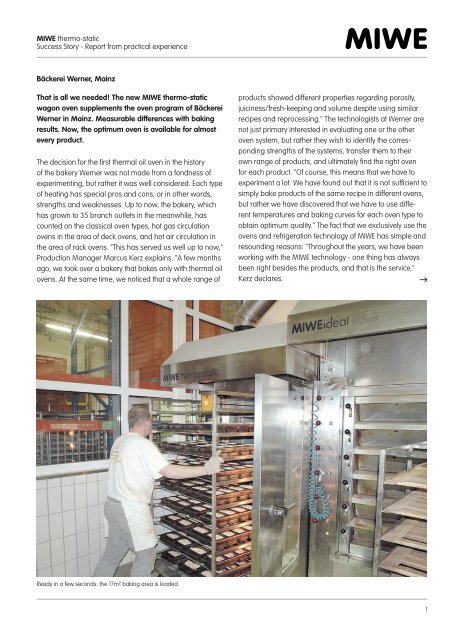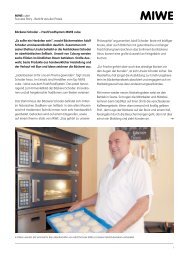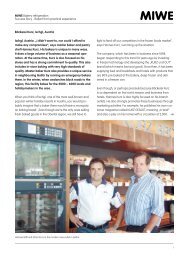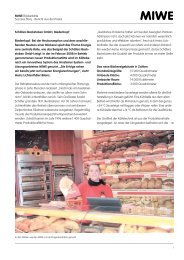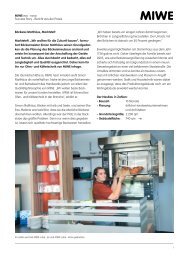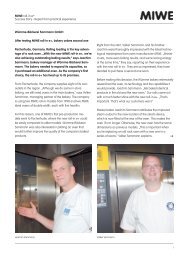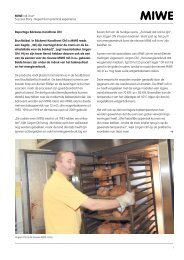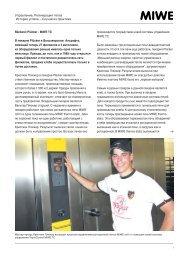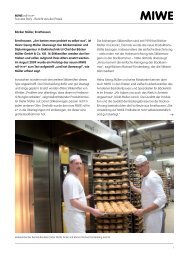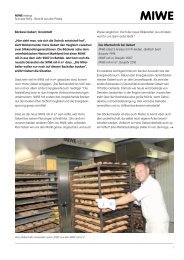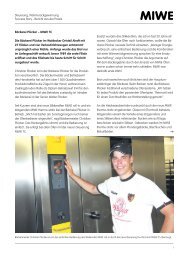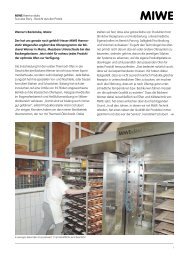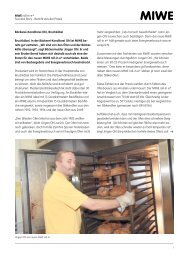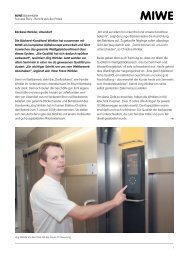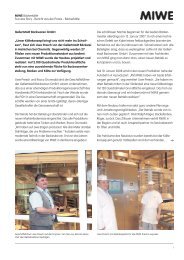Success Story: Werner's Backstube, Mainz - Miwe
Success Story: Werner's Backstube, Mainz - Miwe
Success Story: Werner's Backstube, Mainz - Miwe
You also want an ePaper? Increase the reach of your titles
YUMPU automatically turns print PDFs into web optimized ePapers that Google loves.
MIWE thermo-static<br />
<strong>Success</strong> <strong>Story</strong> - Report from practical experience<br />
Bäckerei Werner, <strong>Mainz</strong><br />
That is all we needed! The new MIWE thermo-static<br />
wagon oven supplements the oven program of Bäckerei<br />
Werner in <strong>Mainz</strong>. Measurable differences with baking<br />
results. Now, the optimum oven is available for almost<br />
every product.<br />
The decision for the first thermal oil oven in the history<br />
of the bakery Werner was not made from a fondness of<br />
experimenting, but rather it was well considered. Each type<br />
of heating has special pros and cons, or in other words,<br />
strengths and weaknesses. Up to now, the bakery, which<br />
has grown to 35 branch outlets in the meanwhile, has<br />
counted on the classical oven types, hot gas circulation<br />
ovens in the area of deck ovens, and hot air circulation in<br />
the area of rack ovens. "This has served us well up to now,"<br />
Production Manager Marcus Kerz explains. "A few months<br />
ago, we took over a bakery that bakes only with thermal oil<br />
ovens. At the same time, we noticed that a whole range of<br />
Ready in a few seconds: the 17m² baking area is loaded.<br />
products showed different properties regarding porosity,<br />
juiciness/fresh-keeping and volume despite using similar<br />
recipes and reprocessing." The technologists at Werner are<br />
not just primary interested in evaluating one or the other<br />
oven system, but rather they wish to identify the corresponding<br />
strengths of the systems, transfer them to their<br />
own range of products, and ultimately find the right oven<br />
for each product. "Of course, this means that we have to<br />
experiment a lot. We have found out that it is not sufficient to<br />
simply bake products of the same recipe in different ovens,<br />
but rather we have discovered that we have to use different<br />
temperatures and baking curves for each oven type to<br />
obtain optimum quality." The fact that we exclusively use the<br />
ovens and refrigeration technology of MIWE has simple and<br />
resounding reasons: "Throughout the years, we have been<br />
working with the MIWE technology - one thing has always<br />
been right besides the products, and that is the service,"<br />
Kerz declares.<br />
g<br />
1
<strong>Success</strong> <strong>Story</strong> - Report from practical experience<br />
The reprocessing of bread requires a lot of manual work.<br />
Changed operational sequences<br />
The production at Bäckerei Werner has completely changed<br />
within a year. Up till that point, the bakery did not have instore<br />
baking; the full product range was baked in production<br />
and subsequently distributed to the branch outlets. "The<br />
entry into in-store baking was worthwhile since the increased<br />
costs for the oven technology used in the stores are<br />
by far compensated by the higher sales quantities," Kerz<br />
explains. For production, this means that more than half of<br />
the daily 30,000 hard rolls are no longer baked in the MIWE<br />
roll-in rack ovens, but in flexible baking stations, which<br />
naturally come from MIWE, as well. Due to this switchover,<br />
the oven capacity in the rack oven area is actually too big 10<br />
roll-ins; what the bakery really needs, and now, is a greater<br />
refrigeration area. This situation will not continue for long,<br />
as the production engineers of MIWE are already measuring<br />
the areas. The "eye of a needle" refrigeration technology<br />
will thus soon be a thing of the past. Even the too small<br />
shipping department will be enlarged, as the bakery has<br />
been all but overrun by its own growth in the last few years.<br />
In addition to the good technical equipment, however, the<br />
bakery's success is due to the employees' experience and<br />
conscientiousness in production. They work meticulously,<br />
2<br />
Unmoulded wheat bread is baked in great quantities, and is very much in<br />
demand.<br />
challenge their recipes and operational sequences are<br />
again and again, and, in particular, look for better solutions<br />
for quality. "As our number of self-baked goods increases,<br />
we are trying to reduce the percentage of convenience<br />
products as much as possible. We are very much aware<br />
that we will thus lose part of the reliability during the<br />
reprocessing and proofing," Kerz explains. The bakery will<br />
compensate this through the technical skills of the employees,<br />
and as far as possible, through the standardization of<br />
the operational sequences.<br />
The refrigeration suction device<br />
Switching to in-store baking has also caused a few problems<br />
at Werner. How can you accomplish a safe and<br />
smooth transport of a such large number of dough pieces?<br />
In this case, the answer also comes from Arnstein: MIWE<br />
smartproof. The dough pieces are stored on special<br />
boards, which are provided with small lateral slots. They<br />
are subsequently stacked on boards in a special shock<br />
freezer, which has the property not to inject cold air but<br />
to suck it off. The process shines due to its high efficiency,<br />
which results in less energy consumption and high capacity.<br />
In a conventional flash freezer, the boards with the dough
pieces have to be loaded in the rack trolley. Due to the big<br />
intermediate spaces, only a fractional part of the dough<br />
pieces quantity can be loaded; for MIWE smartproof, the<br />
boards are directly on top of each other. Nonetheless, the<br />
system provides a smooth heat transport. In this way, the<br />
dough pieces are not dehumidified and only cooled down<br />
to almost 0°C. They can subsequently be either stored in<br />
a cooling cell or directly forwarded to the shipping department.<br />
The accumulated cold is sufficient to store the<br />
dough pieces for several hours without further cooling, and<br />
the baking is performed at the branch outlet if required.<br />
"Without this system, we would have quality problems with<br />
each temperature fluctuation," Kerz says.<br />
MIWE thermo-static, the rational bread oven<br />
At Werner, the thermo-static is mainly used as a bread<br />
oven. At the moment, it is a great relief for the employees.<br />
A major part of bread production is tin bread, which had to<br />
be laboriously placed into and removed from the drawplate<br />
hearth by hand in the past. Now, you can simply load<br />
the three trolleys of the wagon oven with the boxes, mostly<br />
The thermo-static is ideal for tin bread because the handling functions as<br />
easy as with a rack oven.<br />
already after the reprocessing, and then push the corresponding<br />
trolley into the oven. This is facilitated by MIWE slide;<br />
a robust loading help that reduces the rolling resistance<br />
to a minimum and is almost troublefree as a mechanical<br />
solution. Other manufacturers focus on automatic drives,<br />
but these drives are not only an additional part, but once<br />
they suffer damage, they bring about no real relief. "Open<br />
the door, load the trolley, close the door, and then start<br />
the program; it takes less than 10 seconds to load a 17 m²<br />
baking area," Kerz says enthusiastically. The bread from the<br />
thermal oil wagon oven is noticeably juicier since baking<br />
loss is lower thanks to this system. This has consequences<br />
for quality since the bread is fresher and juicier longer. Added<br />
to this are the absolutely uniform baking results, which<br />
constantly amaze bakers.<br />
The option cool-down is available<br />
The advantage of the thermal oil technology is the high heat<br />
storage capacity. What is a real blessing for baking<br />
batch after batch can sometimes be a problem during product<br />
switchovers. It takes simply too long until the<br />
At Werner, the unloading is carried out with unloading boards; an automatic<br />
loading is not possible due to the different oven mass.<br />
g<br />
3
<strong>Success</strong> <strong>Story</strong> - Report from practical experience<br />
At Werner, the rack ovens are installed as an island. Five on the one side,<br />
five on the other. One bakery, and one pastry shop.<br />
temperature can be significantly reduced. Normally, it is<br />
seldom a problem with a sophisticated baking operational<br />
sequence, but the oven is not as flexible as a hot gas<br />
circulator. MIWE has meanwhile recognized this problem<br />
and thus developed the cool-down option and registered<br />
it for a patent. In this way, the thermal oil coming from the<br />
oven is cooled down in a water bath via a heat exchanger.<br />
Of course, the heat withdrawn in this way can be reused, for<br />
example, for water heating. For the oven, this means that<br />
not only static temperature curves can be used, but also, for<br />
A brief portrait of the Bäckerei Werner bakery<br />
Employees<br />
Proprietor: Manfred Werner (one-man business)<br />
Robert-Bosch-Straße 34<br />
55129 <strong>Mainz</strong>-Hechtsheim<br />
Specialty stores: 38<br />
the first time, real baking curves. In this way, you can completely<br />
change and control the baking behavior. The oven at<br />
Werner is already provided with this option, and will soon be<br />
equipped with the cool-down system. You might think this is<br />
only an additional gadget, but the technologists at Werner<br />
are convinced that the new control elements can further<br />
improve the baking results. "Nowadays, it is not enough to<br />
be good; you have to be the best to succeed in the long run,"<br />
Production Manager Kerz comments.<br />
Production: 40, of which 10 are apprentices<br />
Sales: approx. 50<br />
Shipping department/logistics 10 drivers/3 commissioners<br />
Administration: 6<br />
Numerous layered pastry specialties are produced in the pastry shop.<br />
MIWE Michael Wenz GmbH • 97448 Arnstein • Telephone +49-9363-68-0 • Fax +49-9363-68-8400 • www.miwe.com 4<br />
Dated: 0809


